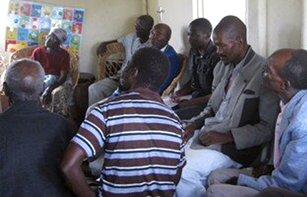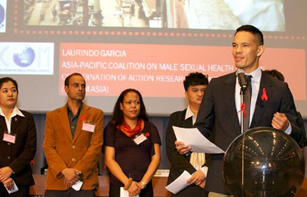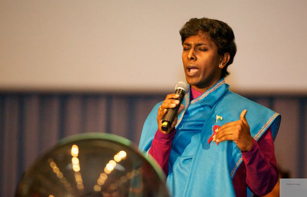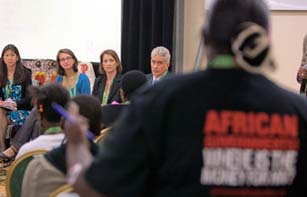
At the Red Ribbon Award special session, the winners were congratulated by many eminent personalities including Mr. Sidibé, UNAIDS Goodwill Ambassador HRH Crown Princess Mette-Marit of Norway, U.S. Congressman Jim McDermott, Minister of Health and Social Affairs of France, Marisol Touraine and International Coordinator and CEO GNP+, Kevin Moody. Credit: UNAIDS/Chris Kleponis.
WASHINGTON, DC, 25 July 2012— Ten community-based organizations, which have shown exceptional and inspiring action on AIDS were honoured with the 2012 Red Ribbon Award in a special session of the XIX International AIDS Conference (AIDS 2012) on Wednesday. The Red Ribbon Award is the world's leading award for innovative and outstanding community work in the response to the AIDS epidemic.
The 2012 winning organizations are from Egypt, Haiti, India, Iran, Kenya, Mexico, Myanmar, Sri Lanka, the Russian Federation and Uganda. Over 1400 nominations from more than 120 countries were received by the Red Ribbon Award secretariat, which is hosted by the Joint United Nations Programme on HIV/AIDS (UNAIDS) in partnership with other UN organizations, AIDS 2012, the Global Network of People Living with HIV/AIDS, STOP AIDS NOW!, the Global Network of Women Living with HIV/AIDS and the International Council of AIDS Service Organizations. A technical review committee of civil society representatives selected the winners. Each of the winning organizations will receive a US$10,000 grant and international recognition for their innovation and leadership and have been invited to participate in AIDS 2012 in Washington D.C.
“The winners of the Red Ribbon Award 2012 have accomplished so much with so little. They work at the grassroots level in very challenging situations to ensure that vulnerable groups and people living with HIV get the information, services and opportunities they need,” said UNAIDS Executive Director Michel Sidibé. “Communities are where the response to AIDS started and it is their energy, innovation and leadership that have set us on the course to end of AIDS.”
The winners of the Red Ribbon Award 2012 have accomplished so much with so little. They work at the grassroots level in very challenging situations to ensure that vulnerable groups and people living with HIV get the information, services and opportunities they need
UNAIDS Executive Director Michel Sidibé
At the Red Ribbon Award special session the winners were congratulated by many eminent personalities including Mr. Sidibé, UNAIDS Goodwill Ambassador HRH Crown Princess Mette-Marit of Norway, U.S. Congressman Jim McDermott, Minister of Health and Social Affairs of France, Marisol Touraine and International Coordinator and CEO GNP+, Kevin Moody.
Crown Princess Mette-Marit presented the award to the winners and said, “I am proud to give the awards to these outstanding organizations, whose actions in the communities they serve truly make a difference to people affected by HIV. The community response to HIV is at the heart of the AIDS response.”
Nobel laureate and General Secretary of Myanmar’s National League for Democracy, Aung San Suu Kyi delivered her remarks through a video. She stressed the importance of community-based organizations and said, “By strengthening the community we strengthen our chances of achieving democracy and of building up strong democratic institutions."
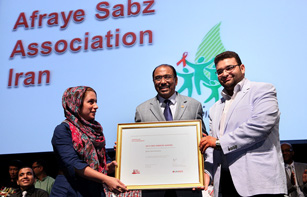
The UNAIDS Executive Director presents the Red Ribbon Award in the category 'Prevention among/by people who use drugs' to representatives of the Afraye Sabz Association, based in Iran's Kermanshah Province, which has increasing numbers of people living with HIV, specifically among young people who inject drugs. Credit: UNAIDS/C. Kleponis
The Red Ribbon Award was first presented in 2006 and since then has been handed out every two years at the International AIDS Conference. This year there were five award categories and the ten winners are listed below by category:
1) Prevention of sexual transmission
The Help, Myanmar focuses on prevention, care, support and advocacy for men who have sex with men (MSM) and works to ensure that the voices of MSM are heard and their issues taken up at the national level. All members of the HELP are MSM and almost half are living with HIV. More
SEROvie, Haiti, focuses on the health and rights of Haiti’s sexual minorities and became a vital source of aid, support and advocacy for sexual minorities following the January 2010 earthquake. SEROvie conducts HIV prevention, health referrals, and psychological and social support, as well as home-based care visits, vocational training and a micro-credit programme. More
2) Prevention among/by people who use drugs
Afraye Sabz Association, Iran is in Kermanshah Province, which has increasing numbers of people living with HIV, specifically among young people who inject drugs. The association promotes HIV awareness, especially among youth, by providing educational and other complementary services, as well as support to PLHIV and their families.
I am proud to give the awards to these outstanding organizations, whose actions in the communities they serve truly make a difference to people affected by HIV. The community response to HIV is at the heart of the AIDS response
Crown Princess Mette-Marit of Norway
Espolea, Mexico offers a space where young people feel free to think, create and perform and focuses on three central issues for young people: HIV, gender, and drug policy. The group works for a consolidated, comprehensive national agenda for young people, that encourages their participation locally, nationally and internationally.
3) Treatment, care and support
The Kenya Hospices & Palliative Care Association (KEHPCA), Kenya represents all of the country’s palliative care service providers. Its mission is to scale up palliative care services and ensure those in need receive the services. Approximately 27% of Kenyan hospice patients receive palliative care for HIV and AIDS and KEHPCA has advocated extensively for the integration of palliative care into health services in Kenya. More
Positive Women’s Network (PWN+), Sri Lanka works to empower its PLHIV members and reduce the discrimination and stigma that women living with HIV face when accessing health services. The group also advocates for global and national policies and runs two drop in centres operated by PLHIV for PLHIV to provide safe, secure, confidential and stigma-free environments for counselling services, financial and emotional support. More
4) Advocacy and human rights
Initiative Group ‘Patients in Control’, Russian Federation is a grassroots initiative started in 2010 that now involves about 50 leading activists from across Russia. It organizes street actions, press conferences and roundtable discussions focused on issues such as drug stock-outs and the absence of HIV treatment guidelines. The group has achieved significant results in terms of government action on these issues.
Delhi Network of Positive People (DNP+), India seeks to improve the treatment and facilities for PLHIV and provides a platform to help empower patients to make informed treatment decisions. Over the years the group’s work has expanded from a support group to service delivery and human rights advocacy. More
5) Stopping new HIV infections in children and keeping mothers alive, women's health
Giramatsiko Post Test Club, Uganda, is an organization for and run by rural women living with HIV. The organization provides skills and knowledge for HIV prevention, care, support and treatment. It advocates for the rights of women living with HIV and their families and empowers women by increasing their livelihood skills. The organization has established 19 Post Test Clubs. More
Global Youth Coalition against AIDS (GYCA) Egypt is a group of young activists working to raise community awareness around health issues, specifically taboo topics such as sexual and reproductive health and rights, and advocating for a human rights-based approach to HIV/AIDS interventions that includes accurate information, condoms and needle exchange for young people. They have an initiative which works with women from low-income communities.










